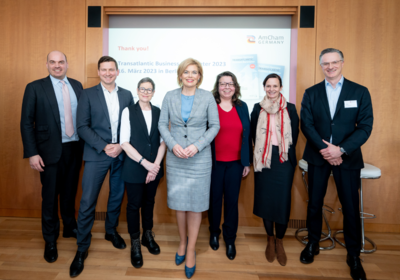Members and stakeholders from the transatlantic business community gathered at the Allianz Forum in the heart of Berlin on the occasion of the Transatlantic Business Barometer 2023. The Transatlantic Business Barometer is an annual survey conducted by Roland Berger and AmCham Germany assessing U.S. and German viewpoints on their partner’s business location and gauges trends in transatlantic business relations.
In her welcoming remarks, Michelle Schmitz, Head of Allianz Representative Office Berlin, set the larger context of the discussion, namely how Germany and the U.S. stand in the larger dynamics of the global economy. In this regard, it is essential that the transatlantic economies find solutions to remain competitive and foster sustainable transformation amidst challenges and emerging global competitors. Simone Menne, AmCham Germany President, provided a key point for improving transatlantic relations in the long run, namely by fostering resilience and innovation without seeking protectionist measures. Parliamentary State Secretary Mario Brandenburg gave the keynote speech in which he outlined strategies necessary to improve Germany’s attractiveness as a business location. Energy costs are certainly not the only challenge ahead. Addressing the advancement of technologies and shortage of skilled workers is essential. All of these areas complement well with the U.S., thus transatlantic partners must use this chance to strengthen cooperation and to enhance knowledge-transfer.
Marcus Berret, Global Managing Director of Roland Berger, provided key insights to the results of the survey and set the foundation for the ensuing panel discussion. On a positive note, transatlantic sentiment has grown stronger throughout the last years, which signalizes a strong bond between the U.S. and Germany. Nevertheless, regarding Germany, both as a location and as a business player, two main points were subject of attention: The decline of Germany’s assessment as a good business location for the third year in a row and the low rate of growth expectancy for U.S. companies investing in the country. A worrisome trend as a conclusion from this analysis is Germany’s danger of losing its status as a relevant potential sales market.
The panel discussion for the event provided political voices and perspectives from both German and U.S. companies. Following speakers comprised the panel, which was moderated by Daniel Andrich, General Manager of AmCham Germany:
- Marcus Berret, Global Managing Director, Roland Berger
- Mario Brandenburg, Parliamentary State Secretary, Federal Ministry of Education and Research
- Julia Klöckner, MdB, Economic Policy Spokeswoman of the CDU/CSU Parliamentary Group in the German Bundestag
- Helene Lengler, Managing Director, SAS
- Simone Menne, President, AmCham Germany
Each speaker provided their respective views on how to move forward with the challenging situation and carved out tangible solutions to safeguard Germany’s reputation and also strengthen transatlantic cooperation in the larger picture. Such ideas include:
- The call to enhance innovation and resilience, which has been visible especially since the start of the Russian war against Ukraine.
- Fostering a solid learning environment within Germany and providing possibilities for individuals to expand their skills to acquire and retain a strong workforce.
- Boost transatlantic industrial policy and call for transatlantic alignment regarding economic policies to strengthen competitiveness and balance emerging competitors.
- Reframe the discussion on digitalization in such a way to understand the actual users of technological tools and infrastructure to meet their needs and pursue a pragmatic and sustainable digital strategy.
- Reduce administrative bureaucratic hurdles in economic and financial settings.
These points lead to a clear path of U.S.-German cooperation in many fronts. The willingness and substantial progress is there, and both the U.S. and Germany have complementary business strengths as made clear by the analysis of the survey. The main task now is to become more concrete in our mutual goals, work towards a sustainable future and tap into the potential of our societies.
We wish to thank our partner of the survey Roland Berger, our speakers, our guests, and our event sponsors, without whom this event would not have been possible: Allianz SE and SAS Institute.
You can access all the press material regarding the Transatlantic Business Barometer 2023 here.

